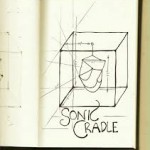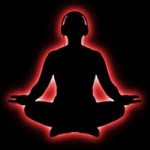
What if the brain gains associated with meditation practice could be married to the soothing elements of music in an incredibly comfortable cocoon of darkness? What if technology can be used to foster positive mood and mind states?
Jay Vidyarthi says he’s a dreamer, because he “wants to help people achieve a state of peace and then apply their happiness forward to generate more positivity.” But he’s also one heck of a practical guy who has woven his interest and expertise in brain function, music and technology into a new device — the Sonic Cradle — that is premiering this week at the exclusive TEDActive conference in Palm Springs, California.

Vidyarthi, a musician who earlier studied psychophysics and neuroscience at McGill University, is now pursuing a master’s degree at Simon Fraser University’s School of Interactive Arts and Technology. He explained his goals for the Sonic Cradle in an interview with Better Brain Better Life: “The goal is twofold. In the short-term, I want to provide a meditative experience that decreases stress and anxiety and helps people relax during the experience and directly afterward. But also, in the long-term, I think the experience of meditation in a sensory-deprived context will help people understand that meditation is not necessarily religious but truly a psychological phenomenon. This is important because science has shown it to be a very beneficial process. We also want users to experience themselves as capable of achieving meditative experience, and give them an intimate, experiential understanding of meditation. The hope is that this will motivate them to establish their own practice. I anticipate that a Sonic Cradle experience will help users to understand a little better what they’re aiming for if and when they try to get their own meditation practice going.”

Sensory deprivation is seen by Vidyarthi as a ‘lubricant’ that helps the Sonic Cradle user more easily enter the world of the mind. “This is similar to how we turn off the lights when we watch a movie, thus limiting access to our physical world in order to better immerse into the world depicted on film. As meditators, we often close our eyes to help this process, but new meditators are easily bored. So why not give them a choiceless environment: eyes open or eyes closed, all they see is black when in the Sonic Cradle.”
Vidyarthi believes that the Sonic Cradle may help address the common obstacles that come up when people are learning to meditate, but not a replacement for traditional meditation techniques and practices.
One of Vidyarthi’s broader objectives is to help move forward the idea of employing technology for positive psychological effects. “Technology has been far too focused on productivity and efficiency. I want to see more talented people around the world start seriously considering applications and devices designed to help people develop self-knowledge, inner peace and a sense of calm. Or perhaps more practically, what if the designers of everyday devices start to minimize the negative psychological effects of their devices and instead design them to maximize their ability to generate a sense of calm along with their primary functions? Instead of beeps, ringtones, notifications and bright screens, maybe we can take a mindful approach to contextual design for calmness and introspection!”
It looks as though Vidyarthi has his dreaming work cut out for him.
[1] Perhaps most widely known for its stimulating TEDTalks videos available over the Internet, TED defines itself thus: TED (www.TED.com) is a nonprofit devoted to Ideas Worth Spreading. It started out (in 1984) as a conference bringing together people from three worlds: Technology, Entertainment, Design. Since then its scope has become ever broader. Along with two annual conferences — the TED Conference in Long Beach and Palm Springs each spring, and the TEDGlobal conference in Edinburgh UK each summer — TED includes the award-winning TEDTalks video site, the Open Translation Project and TED Conversations, the inspiring TED Fellows and TEDx programs, and the annual TED Prize.
